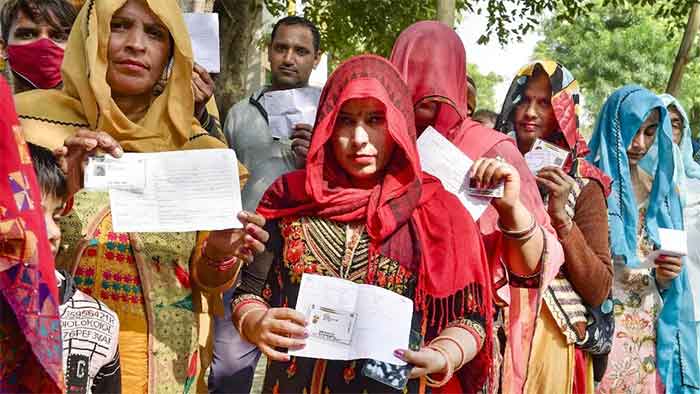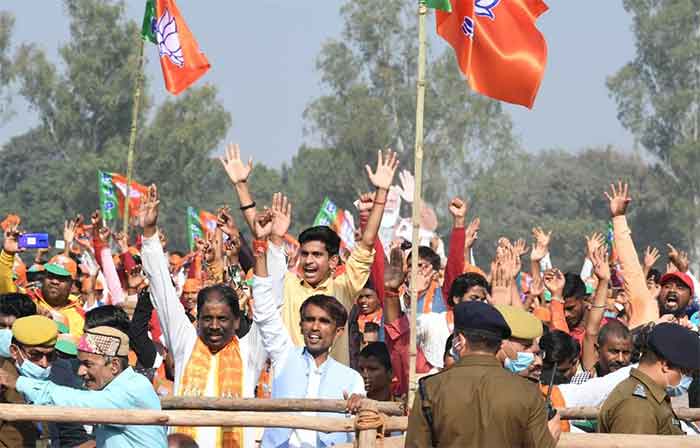
The election tempo in Uttar Pradesh is getting more communal with every phase of voting, thanks to the virulent communal campaigning of incumbent BJP.
With its sizeable population, existence of diverse caste groups, active identity politics, considerable muslim minority population, the mandate of Uttar Pradesh resulting from the 403 assembly seats will be decisive in understanding the future course of National politics. The strength of opposition parties in their mammoth task of finding an electoral solution of the hegemonic Hindutva force of BJP will be checked. While for BJP, it remains an election to ascertain the legitimacy for the state which has been constructed under the aegis of Yogi Adityanath’s Muslim hate filled Hindutva.
As the election is simmering with voting for half of the total seats left, the mantra of success for BJP is a communally poised election campaign driven on the facade of development and sushasan (good governance). Exhorting communal propaganda remains the ultimate recourse for BJP in the election of Uttar Pradesh. Communaly charged exhortation is the most essential ingredient of BJP campaign, routinely done by its leaders from top echelons to the lower level. Prime Minister Modi, who vacuously relates cycle used for bomb blast to Samajwadi Party symbol to a local MLA from Dumariyaganj saying that Hindus not voting for BJP has Muslim blood and are traitors, Uttar Pradesh is witnessing one of the most communal election campaign in the history of Indian politics by BJP. The Bharatiya Janata Party having enduring ties with multiple militant organisation are working on ground to make this communal divide look more real. BJP has largely changed the culture of Indian politics through a continuous attack on secular provisions, minority rights and composite nationalism of the country. Yogi Adityanath’s rule in Uttar Pradesh has already made the hatred towards Muslim most subtle and institutionalised in state apparatus. The election campaign of BJP is trying to reignite communal epiphany amongst the public to reap Hindu votes. The electoral incentive of communal identitarian politics has been in favour of BJP historically.
BJP is now claimed to have a fantastic program of accommodating all different non dominant sub-castes from OBC and Dalit community. Owing to social engineering, a greater balance is achieved on the question of representation of the subaltern castes in larger numbers within organisation as well as in the legislature. Albeit this has helped BJP in shooting up the vote percentage across caste groups, the communal Hindutva moorings of BJP gains centrestage in its election campaign. It is because a unified Hindu identity, based on communal hatred remains the defining feature of Hindutva politics. A definite line of campaigning, ideologically supervised by Hindutva communal agenda is overpowering the rhetoric of development achieved under five year Yogi rule. This also signals towards the crisis BJP is facing, given the ongoing complexity of electoral politics in Uttar Pradesh.
The 2017 election which brought BJP into power with an overwhelming majority also witnessed a communaly charged election. Modi, being Prime Minister, said only qabristan is constructed under Akhilesh rule and not shamshan. Even after five years, the shamshan qabristan binary is kept afloat by BJP in campaigning. The Hindu victimhood is largely endorsed and invoked by BJP to promote itself as the custodian of Hindu religious interests and saviour of their cultural life. This directly benefits BJP propaganda of hate filled Hindutva politics and leads to creation of Hindu and Muslim as two impossible coherent groups.
Muslims in BJP political campaign: Abbajan, Pakistan, Taliban, Qabristan
From bringing Aurangzeb into life to associating the name of Jinnah to Samajwadi Party, the portrayal of Muslims historically as invaders and alien to the Hindu civilizational ethos of the country is done by BJP. The political logic in UP is driven dominantly by the theatrics of Hindutva which has created a serious form of political marginality of Muslims. Questioning their patriotic sentiment has already become a norm-in-practice, the BJP campaign is now normalising the stereotypical construction of Muslims along the distorted historical lines of Hindutva. Muslim are caricatured as mafia, goons, rioters, having undignified eyes on hindu womens and highly disruptive to peace in society. Muslims are increasingly shown as the single source of all problems, most of which is now being fixed by BJP. The construction of Ram Mandir is shown as the recovery of Hindu self. The overdue of Kashi-Mathura is one to be corrected to continue the reestablishment of the lost glory of Hindus.
The BJP communal electoral campaign goes through a two step process. Driven from logic of hate filled communalism, brazen anti-muslim propaganda is promoted at first. Muslims are demonised by relating them to invaders, destroyers of temples and working against national interest. This stereotypical portrayal of Muslim is then affixed to opposition parties claiming that they’re protector and appeaser of the Muslims. This can no better be promoted then the 80 vs 20 statement of Yogi Adityanath.
This is also aided with a constant instilling of fear amongst Hindu majority about the return of the previous regime and loss of the glorious progress achieved under BJP. Amit Shah in an election rally said that Akhilesh Yadav will stop Ram Mandir work, if elected to power. Comparison between building Haj houses in the SP government and Hindu religious places in the BJP regime is highlighted. Words like Jalidar topi (netted caps), Abba Jan and other Islamophobic metaphors remain popular parlance by BJP leaders from election stages to create a political atmosphere of steep polarisation on religious lines.
Communal Hindutva as a weapon to counter the opposition alliance:
With BSP doing unenthusiastic political campaigning in the election, Samajwadi Party is perceived as the principal challenger to BJP in UP. SP has entered into alliance with small and regional parties belonging to different OBC sub-castes. Alongwith this, the alliance with RLD in UP west has helped SP to reentrench the lost Jat-Muslim unity post 2013 riots and contain the Hindutva crusade.
BJP also suffered a major jolt when multiple cabinet ministers and MLAs resigned to join SP, charging it for philandering social justice. Stalwarts like Swami Prasad Maurya, Dara Singh Chauhan and others are influential leaders of non Yadav OBC castes who have switched side. This has solidified the alliance of SP and boosted it’s morale just before election, further jeopardising BJP’s political ambition. Overall the alliances made by SP has helped Akhilesh Yadav to shed it’s image of being Yadavwaadi and Muslim appeaser and helped him to outreach other sub-castes catering the social justice claim. His talk about progressive politics and development agendas are generating a favourable atmosphere.
The communal Hindutva election campaign is endorsed by BJP to counter the oppositional alliance. It is difficult to ascertain a comfortable win in UP again due to the above-mentioned change in the political landscape of UP. The polarisation achieved by Hindutva campaign based on communal rhetoric can further the interest of BJP and work as a catalyst in creating a Hindu Muslim binary.
Why is the Hindu identity so important for BJP:
BJP’s electoral strategy is framed with a motive to marginalise Muslims from political representation. In the 2017 election, the message of not needing muslims for winning election in a state which makes almost twenty percent of population was given when they decided not to field any muslim candidate. Muslims as the otherised community helps BJP in creating a monolith Hindu political identity during elections. By disowning them, BJP actually tries to showcase itself as the custodian of Hindu cultural sphere and become guardian of their religious sentiments. Muslims incentivise BJP when it distances itself from them, as it helps in polarising Hindus to its side by the constant vilification of Muslims.
Calling it as cultural nationalism, BJP’s impregnation of Hindu pride by bringing it’s election campaign encircled around hindu religious symbols also represents the crisis of BJP. The massive failure of the Yogi administration in the prospects of development and governance is another reason why steep communal polarisation and the making of Hindu identity remains quintessential for BJP to gain political success.
A unified Hindu identity has grand appeal, cutting across caste class cleavages existent in society. A singular logic of Hindu unity based on hatred towards muslims is also used to establish concord between different caste classes and their competing claims. The failure to fulfill these demands and anxieties of different sections resulting from BJP misgovernance is managed by shifting their loyalty to Hindu identity, based on a commonised hatred towards Muslims. This shift from caste to a unified Hindu identity helps BJP to downturn the possibility of splintering of votes to the opposite camp.
Election campaign based on communal radicalisation is done to entrench the Hindu Muslim binary and let not people decide their vote based on material interests. Creating sentiments amongst the population, centred around communal identity and ensuring it to be the dominant political emotion while deciding their vote is the election project of BJP in Uttar Pradesh. The campaign of BJP has already become very communal, far from a development based appeal which they claim to have achieved in their tenure. The relentless communal campaign by senior BJP leaders with an urge to bring fundamental division in society along religious lines shows the harmony BJP has established with communalism.
Himanshu Shukla is a postgraduate in Political Science from DU. He is also working as a researcher and translator. He is also a student activist of leftist student organisation.












































